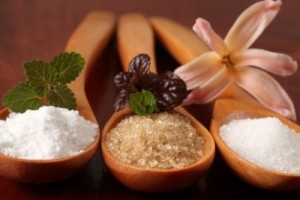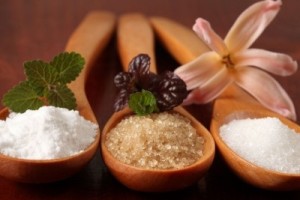We have all heard by now that sugar is as addicting as cocaine and heroin but it’s also now being investigated as a culprit in Alzheimer’s due to its effects on the brain. Most people I know have a sweet tooth that is hard to tame and while it’s not easy to give up the white stuff cold turkey, there are now various alternative sweeteners on the market that are making that transition a little easier. But how do you know which ones to choose and which are the healthiest options?
Here we’ve compiled a list of 8 of the healthiest and as close to nature alternative sweeteners on the market today. While not all sweeteners will be suitable depending on any preexisting conditions you may have, keep in mind that just like sugar, these are to be consumed in moderation.
Raw Honey
Unheated and unfiltered raw honey is cloudy and contains healthful propolis and pollen. Although it is a simple sugar, less is needed because it’s sweeter than white sugar.
Raw honey has so many wonderful health benefits. It’s a natural antibacterial, boosts the immune system, promotes digestive health, and is high in antioxidants. It also stabilizes blood pressure and helps balance blood sugar levels.
WARNING: It should not be given to children younger than two to protect against infant botulism.
Give these Coconut Macaroons a try using honey.
Stevia
Stevia is probably one of the most well-known and popular natural sweeteners. The sweet leaves have been used by humans for hundreds of years. It’s 30 times sweeter than sugar so a little goes a long way.
While it is not a significant source of nutrition, the great thing about stevia is that it will not affect blood sugar levels at all, making it a great all-natural sugar alternative for diabetics, people with hypoglycemia or candida. Available in powdered, liquid, concentrate, tea or tablet form.
Here’s an awesome Lemon Blueberry Bread that uses stevia.
Lucuma Powder
A product of Peru, this is a delicious and low-sugar sweetener that also provides 14 essential trace minerals. Lucuma is a good source of antioxidants, dietary fiber, healthy carbohydrates, and vitamins including beta-carotene, niacin and minerals including zinc, potassium, calcium, magnesium and iron.
Lucuma can be added to beverages, smoothies, yogurt and cereal, blended it into desserts and baked goods for a sweet and flavorful nutrition boost.
Date Sugar
Date sugar is essentially just dried dates pulverized into a powder. Rich in iron, potassium and vitamins, the high fiber content slows absorption. Date sugar does not dissolve, but is delicious in baking and crumb toppings. It burns easily, so bake with care.
Since it does not melt, date sugar cannot be used as a direct substitute for sugar. For instance, you wouldn’t want to put it in your coffee. However, it is great for baking. Use just 2/3 the amount of date sugar in place of brown or white sugar called for in your recipe.
Coconut Sugar
Coconut sugar contains traces of iron, zinc, calcium, and potassium, we well as antioxidants. It also contains a fiber called inulin, which may slow glucose absorption. For this reason, coconut sugar has a minimal effect on blood sugar levels, making it another ideal option for diabetics.
Coconut sugar contains a taste similar to brown sugar and is a great 1:1 baking substitute for white sugar.
Try these delicious Coconut Sugar Cookies.
Pure Maple Syrup
Pure maple syrup contains only evaporated maple tree sap. It is high in manganese and zinc: 3.5 ounces of syrup provides 22% and 3.7% of their RDVs respectively. Manganese is necessary for several enzymes that are needed for energy production and antioxidant defenses. Zinc is essential for optimal immune system function. Deficiencies of either may lower white blood cell counts and reduce immune system responses.
Like chocolate chip cookies? This Chickpea Chocolate Chip Cookie recipes uses maple syrup as a sweetener.
Xylitol
It can be found in berries, fruit, vegetables and mushrooms. It also occurs naturally in our bodies – in fact, an average size adult manufactures up to 15 grams of xylitol daily during normal metabolism.
Typically comes from corncobs and if not organic, may be genetically modified. It tastes similar to cane sugar, is low in calories, and reportedly does not cause cavities. It may be suitable for diabetics.
Erythritol
Erythritol is found naturally in small amounts in grapes, melons, mushrooms, and fermented foods such as wine, beer, cheese, and soy sauce and is usually made from plant sugars. Sugar is mixed with water and then fermented with a natural culture into erythritol. It is then filtered, allowed to crystallize, and then dried. The finished product is white granules or powder that resembles sugar.
Erythritol has not been found to affect blood sugar or insulin levels and has a zero glycemic index. It’s approximately 70 percent as sweet as table sugar (sucrose) and some say has a taste most similar to white sugar.







Add comment